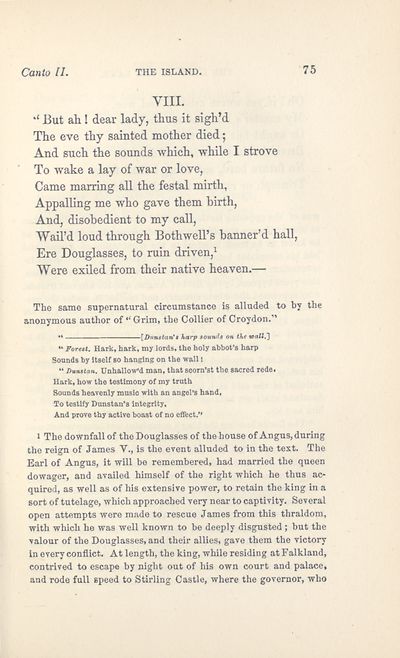Poetry > Lady of the lake
(89)
Download files
Complete book:
Individual page:
Thumbnail gallery: Grid view | List view

Canto 11.
THE ISLAND.
75
VIII.
‘‘ But ah ! dear lady, thus it sigh’d
The eve thy sainted mother died;
And such the sounds which, while I strove
To wake a lay of war or love,
Came marring all the festal mirth,
Appalling me who gave them birth,
And, disobedient to my call,
Wail’d loud through Bothwell’s banner’d hall,
Ere Douglasses, to ruin driven,1
Were exiled from their native heaven.—
The same supernatural circumstance is alluded to by the
anonymous author of “ Grim, the Collier of Croydon.”
•* [Duntiun't harp rounds on the waW,}
“ Forest. Hark, hark, my lords, the holy abbot’s harp
Sounds by itself so hanging on the wall!
“ Dunstan. Unhallow’d man, that scorn’st the sacred rede.
Hark, how the testimony of my truth
Sounds heavenly music with an angel’s hand,
To testify Dunstan’s Integrity,
And prove thy active boast of no effect.”
i The downfall of the Douglasses of the house of Angus, during
the reign of James V., is the event alluded to in the text. The
Earl of Angus, it will be remembered, had married the queen
dowager, and availed himself of the right which he thus ac¬
quired, as well as of his extensive power, to retain the king in a
sort of tutelage, which approached very near to captivity. Several
open attempts were made to rescue James from this thraldom,
with which he was well known to be deeply disgusted ; but the
valour of the Douglasses, and their allies, gave them the victory
in every conflict. At length, the king, while residing at Falkland,
contrived to escape by night out of his own court and palace,
and rode full speed to Stirling Castle, where the governor, who
THE ISLAND.
75
VIII.
‘‘ But ah ! dear lady, thus it sigh’d
The eve thy sainted mother died;
And such the sounds which, while I strove
To wake a lay of war or love,
Came marring all the festal mirth,
Appalling me who gave them birth,
And, disobedient to my call,
Wail’d loud through Bothwell’s banner’d hall,
Ere Douglasses, to ruin driven,1
Were exiled from their native heaven.—
The same supernatural circumstance is alluded to by the
anonymous author of “ Grim, the Collier of Croydon.”
•* [Duntiun't harp rounds on the waW,}
“ Forest. Hark, hark, my lords, the holy abbot’s harp
Sounds by itself so hanging on the wall!
“ Dunstan. Unhallow’d man, that scorn’st the sacred rede.
Hark, how the testimony of my truth
Sounds heavenly music with an angel’s hand,
To testify Dunstan’s Integrity,
And prove thy active boast of no effect.”
i The downfall of the Douglasses of the house of Angus, during
the reign of James V., is the event alluded to in the text. The
Earl of Angus, it will be remembered, had married the queen
dowager, and availed himself of the right which he thus ac¬
quired, as well as of his extensive power, to retain the king in a
sort of tutelage, which approached very near to captivity. Several
open attempts were made to rescue James from this thraldom,
with which he was well known to be deeply disgusted ; but the
valour of the Douglasses, and their allies, gave them the victory
in every conflict. At length, the king, while residing at Falkland,
contrived to escape by night out of his own court and palace,
and rode full speed to Stirling Castle, where the governor, who
Set display mode to:
![]() Universal Viewer |
Universal Viewer | ![]() Mirador |
Large image | Transcription
Mirador |
Large image | Transcription
| Antiquarian books of Scotland > Poetry > Lady of the lake > (89) |
|---|
| Permanent URL | https://digital.nls.uk/109507982 |
|---|
| Description | Thousands of printed books from the Antiquarian Books of Scotland collection which dates from 1641 to the 1980s. The collection consists of 14,800 books which were published in Scotland or have a Scottish connection, e.g. through the author, printer or owner. Subjects covered include sport, education, diseases, adventure, occupations, Jacobites, politics and religion. Among the 29 languages represented are English, Gaelic, Italian, French, Russian and Swedish. |
|---|

